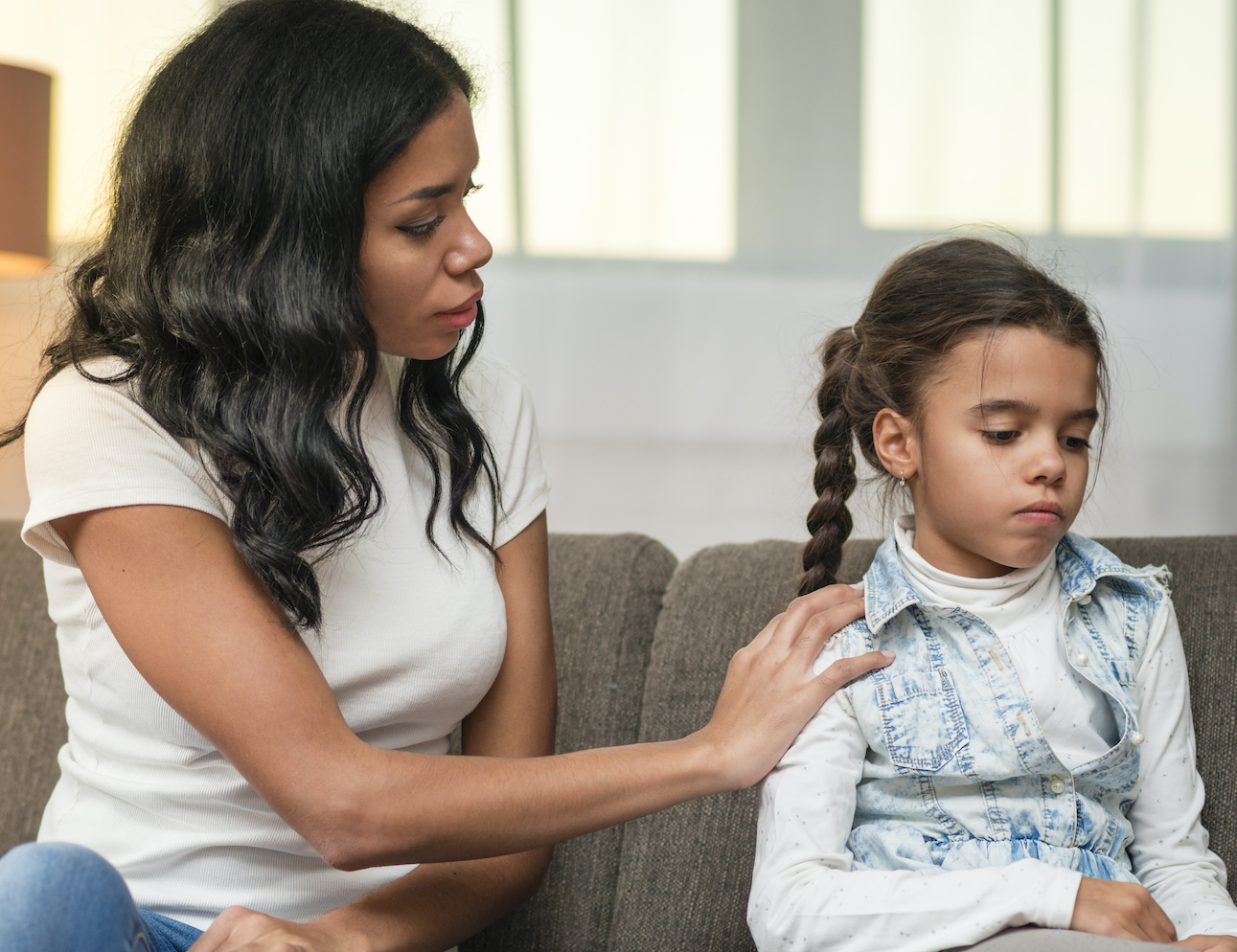How Parents Can Help Children Cope With Trauma [downloadable]
 In the past year, there have also been numerous stressors, including the ongoing pandemic, balancing work and parenting demands, and managing other obligations at home and/or in our personal life. This combination of traumas and stressors may feel overwhelming right now.
In the past year, there have also been numerous stressors, including the ongoing pandemic, balancing work and parenting demands, and managing other obligations at home and/or in our personal life. This combination of traumas and stressors may feel overwhelming right now.
This fact sheet from the National Child Traumatic Stress Network (NCTSN) provides guidance on what parents/caregivers can do to care for their children as they cope with collective traumas.
The following are strategies recommended by NCTSN to help you and your family:
Caring for Yourself
Have compassion for yourself and others. Acknowledge that you are experiencing a lot right now. You may not be able to show up in the same ways you could before. That is okay. You are doing your best. Assume the same for your family, co-workers, and friends. Be flexible when considering what you can do. Consider the perspective of others to help you connect to their emotions and empathize with their experiences.
Acknowledge how your identities are being impacted. You may feel a heightened level of threat, fear, or lack of safety when aspects of your identities (i.e., race, ethnicity, gender identity, sexual orientation, disability status, and religion) are being targeted by violence, policy changes, hate speech and/or other actions. This also may increase your sense of feeling isolated or cut-off from your loved ones, co-workers, or wider community. Find ways to get support from those who share your identities or are allies who understand how these traumas and stresses are impacting you.
Self-reflect before reacting. Take a moment to consider how a situation is impacting you before reacting to others. Your emotions are valid. Your feelings of anger, bitterness, grief, and fears about the future need to be acknowledged before deciding how to respond. You may have to take care of yourself before assisting someone else. Know these feelings may persist. Sometimes, just taking a moment for a few slow breaths can help as you gather your thoughts.Reflect on your potential implicit biases (i.e., attitudes or stereotypes about others you may hold without being truly aware of these views or beliefs) and adjust your response to reflect understanding, caring, and support.
Search for meaning. You may be observing that systems and institutions are failing to protect those they are meant to serve. This can challenge your trust in other people, your religious beliefs, spiritual beliefs, or the ways you think about or view the world. Searching for meaning in the face of discrimination and hate is extremely challenging, only adding to your existing feelings of distress. Reading relevant resources and talking to trusted friends, family members, co-workers, and faith leaders can help you develop or discuss your ideas about why stressful and traumatic things happen and how you can cope with them.
Limit media and social media exposure. Media and social media coverage are constant. At times we feel obligated to “witness” the pain of others, however, you can pace yourself by limiting access to news during blocks of the day to connect to people, pets, nature, or activities that restore and heal. Be cognizant of how you react to news alerts and either disable them or put your devices aside during important tasks that require your focus.
Take time to care for yourself. All of us need to take time for ourselves. It is not selfish, but rather, it allows us to be better able to cope and to support others to the best of our abilities. The Pause, Rset, Nourish (PRN) Framework, a model for wellness, provides tips which may prove helpful throughout the day.
- Pause means taking a moment to scan how your body is feeling and to acknowledge your emotions.
- Reset is helping you to get balanced, steadier, calmer or focused on your next task, and
- Nourish helps you replenish your mind, body, and heart and helps you to see how you can get through difficult times.
Give yourself permission to do these things.
Connect with others. Finding opportunities to connect with others often leads to feeling better even when you are distressed. Engage with family and friends to bring a sense of joy, light-heartedness, and meaningful connections with others. If you are worried about how others are coping, check in with them, and let them know you care. The simple act of noticing can offer healing for others. Conversely, it is also okay for you to let others know how they may support you. For example, ask for support in parenting if you need a break.
Seek help. Sometimes, the layers of stress and trauma become overwhelming and interfere with our ability to complete our daily activities. Remember you are not alone; we all could use extra support navigating these difficult times. Reach out to 211 or your local library to find out about what local community supports are available.
You can also speak to a mental health provider, health provider, or a trusted friend, or call a helpline such as those listed below:
- National Suicide Prevention Lifeline, Call (800) 273-8255, Chat with Lifeline
- Disaster Distress Helpline, Call or text (800) 985-5990 (For Spanish, press “2”) to be connected to a trained counselor 24/7/365
Things You Can Do for Your Children
Spend time talking with your children. Have regular conversations with your children about what they are hearing, how these events are impacting them, and their reactions. Knowing that you are willing to have these conversations lets your children know they can rely on you and that they are not alone with all of these intense emotions. As a family, share situations that are impacting your family or a particular family member, including if one feels threatened because of aspects of their identities. Validate that their feelings are normal and encourage discussion and questions. These are not always easy conversations but are worth having even though they may be hard. Consider what you want to communicate and what values and beliefs you hope to share.
- Use age-appropriate language to talk about what your children have seen or heard, as well as what they have heard others saying.
- Monitor their media exposure and discuss what they have seen, heard, or read. Preschool children should not be exposed to coverage, if possible.
Identify other people your children may find supportive. Children may want to discuss their concerns with you as well as with others who share their identities or with whom they have been talking about current events. Help them find ways of connecting with these people so they can have additional supports during this time.
Help children feel safe. Talk with your children about their concerns over safety and problem-solve ways to address their concerns. This may include getting support from other trusted individuals, alerting school officials about what is happening, or seeking guidance from cultural or religious leaders.
Enhance your child’s coping. Reinforce that your children should be kind to themselves and that there are reasons why they aren’t feeling the same as before. They too can use the PRN framework and learn to pause, reset, and nourish themselves. Find family activities, including cultural and religious practices, that can be done together (e.g., dance night, try new recipes, walking, game night, spending time with out-of-town relatives virtually). Help create a routine for everyone in the family, which includes time for self-care and quiet.
Seek change. Discuss ideas for ways your children want to get involved in creating change against injustices. This could include participating in a community group event, creating a group at school, or showing support to peers who may be feeling an increased sense of vulnerability. These can be small steps as well as larger ones. Be a positive role model for change in actions as well as words. Making a contribution of your time and talent is one way to create meaning or help them cope.
Check-in on a regular basis. Unfortunately, many stressors are likely to continue in the immediate future. Check-in with your children on a regular basis. This reinforces that you are there to support them always, especially during these challenging times.
Ask for help. Reach out when you need help or support as there is no manual for parenting at any time, but particularly during these incredibly stressful times. Your pediatrician, faith leader, and local mental health agencies can be resources for support and guidance.
Teen and young adult focused helplines include:
- The JED Foundation (for emotional health and suicide prevention), Call 1-800-273-TALK (8255) or text “START” to 741-741
- Trevor Project (for LGBTQ+ youth), Call 1-866-488-7386 or text “START” to 678-678
- Love is Respect (for dating abuse and healthy relationships), Call 1-866-331-9474 or text “LOVEIS” to 22522
For Administrators/Supervisors/Educators
- Consider how media events may impact your staff/students. Take time to acknowledge this news, perhaps offering added breaks as needed or taking class/meeting time to discuss.
- Acknowledge that their feelings are valid, will continue, and how these incidents may be impacting their performance (e.g., worried about future, distractible, angry at system failures). Join in on how you have been impacted and discuss ways of coping together.
- Adjust expectations (e.g., review work demands/school assignments, adjust time needed to get work done, encourage healing) and avoid using punitive actions.
- Create opportunities for staff/students to come together to get support and give support to others.
- Make sure staff and students know how to access supports and resources.
By acknowledging these traumas and stressors and making some adjustments, you may improve morale and outcomes.
Download a copy of this fact sheet from NCTSN. See the National Child Traumatic Stress Network website for more information about child traumatic stress.
Source: National Child Traumatic Stress Network, Assisting Parents/Caregivers in Coping with Collective Traumas, https://www.nctsn.org/sites/default/files/resources/tip-sheet/assisting-parents-caregivers-in-coping-with-collective-traumas.pdf | Public domain. Retrieved May 12, 2021
Do you need someone to talk to? To schedule an evaluation or to get advice about your child’s challenges, call or email a CHC Care Manager at 650.688.3625 or careteam@chconline.org CHC teletherapy services are available now.





